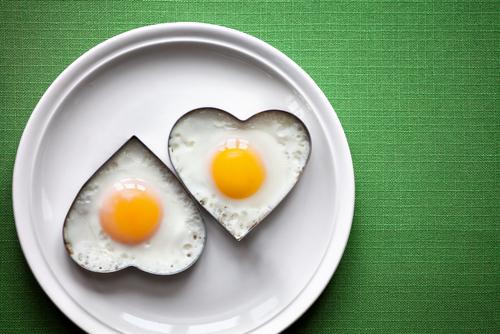We've described research indicating that the cholesterol content of egg yolks shouldn't prevent most people from gaining the nutritional benefits that eggs can provide (see here, for example). And now some recent research suggests that contrary to popular belief, egg consumption may actually alter a person's cholesterol profile for the better. The report was published in the Journal of Nutrition.
Dr. Diana M. DiMarco and colleagues from the University of Connecticut in Storrs enlisted 38 young, healthy men and women between the ages of 18 and 30, none of whom were obese. They investigated the effects on several of these people's cholesterol-related attributes of consuming 1, 2, or 3 eggs per day, compared to eating no eggs.
A bit of background: the cholesterol in eggs is just cholesterol. You can get cholesterol from your diet, or your liver can produce it. Either way, it has to be 'packaged' with proteins (lipoproteins) in order to travel in the blood — thus the low-density lipoproteins (LDL) and the high-density lipoproteins (HDL). LDLs are typically considered 'bad' since they seem most likely to deposit cholesterol in the lining of arteries, leading to plaques and artery blockages. The HDLs, on the other hand, are considered 'good' since they pick up cholesterol from the tissues and transport it to the liver which excretes it into the large intestine. A further complication in the story is that there can be different sizes of both LDLs and HDLs. The small LDLS are considered the most problematic, and the large HDLs are considered most beneficial.
For the first two weeks of the study, participants ate no eggs. Then, for sequential 4-week periods, they consumed first 1, then 2, then 3 eggs per day, for a total experimental period of 14 weeks. How the eggs were prepared or at what time of day they were consumed was totally up to the study participants. At the end of each period, the investigators collected blood samples while the participants were in the fasting state. The types and sizes of lipoproteins were assessed, as were the levels of lutein and zeaxanthin (carotenes found in egg yolks) in the blood. They also measured the activity of an enzyme, lecithin-cholesterol acyltransferase (LCAT), which is thought to facilitate the transfer of cholesterol from tissues by HDLs.
The investigators found that, compared to eating no eggs, consuming from one to three eggs per day resulted in more large LDLs and HDLs in a dose-dependent manner. As well, the activity of the LCAT enzyme was significantly increased. Further, blood levels of both carotenes were also elevated by consumption of 2 or 3 eggs per day — this is significant since absorption of these entities from vegetable sources is not as efficient as it is from egg yolks.
"Thus," the investigators concluded, "eggs can be included as part of a healthy dietary pattern without concern of elevating CVD risk in healthy individuals." And that last part is important, since we cannot extrapolate from these young, healthy people to older folks, or to people who are known to have cardiovascular disease.
It will be important to see if these results can be replicated in other studies, in both similar individuals as well as in other populations.




